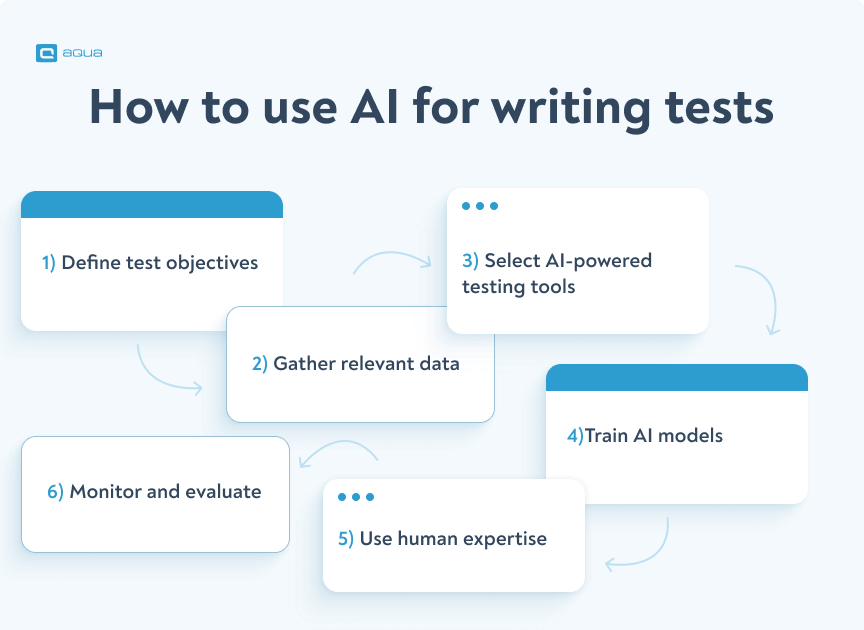You can harness the power of Artificial Intelligence (AI) that is taking almost all industries and fields by storm with GPT solutions. We will show you how to use AI for QA testing, overcome manual test creation limitations, and save a lot of time and energy.
Role of AI in code testing
AI revolutionises code testing, bringing a new level of sophistication and efficiency and helping developers identify and resolve issues with greater accuracy and speed. Here are some essential ways AI enhances code testing:
- Intelligent test generation: Based on code analysis and system behaviour, AI can automatically generate test cases by simulating various scenarios and inputs. With AI algorithms, you can create thorough test suites to cover many conditions, significantly improving test coverage and reducing the odds of unnoticed bugs raising their ugly heads in production.
- Automated bug detection: AI-powered tools can analyse code and identify bugs, vulnerabilities, or performance bottlenecks. Based on machine learning techniques to learn patterns in codebases, these tools are capable of detecting both trivial and complex issues that may be missed by manual testing. Using AI in software testing helps you catch critical issues early in development, saving time and effort in debugging.
- Test optimisation: With AI, you can optimise testing processes by intelligently prioritising test cases based on factors like critical functionalities code coverage and historical data on defects. This allows you to focus your testing efforts on the most crucial areas, saving time and resources while maintaining comprehensive testing practices.
- Intelligent test result analysis: Using AI tools for QA testing can also help you analyse test results, identify patterns, and provide insights into issues. By understanding the root causes of failed tests, you can quickly pinpoint and resolve problems, leading to faster debugging and more efficient code improvements.
- Predictive maintenance: Based on historical data, system logs, and performance metrics, AI can predict potential code failures or vulnerability areas. You can mitigate risks, enhance code stability, and improve overall software reliability by continuously identifying the areas that require your attention.
I'm using AI to generate and improve manual test cases so I don't have to write down everything myself.
And what could be a better solution than aqua cloud when it comes to integrating AI into your testing processes? With aqua, you can generate test cases from requirements in a matter of seconds. Or you can say a word and translate your ideas into comprehensive documents within seconds. Also, you will save valuable time using our AI capabilities to fill test coverage gaps efficiently. aqua gives you a chance to keep all your tests in one place, promoting synergy and streamlining your workflow. With aqua’s AI-driven features, you can also prioritise tests effectively and track improvements effortlessly. So what’s keeping you from turning your testing efforts into a walk in the park?
Generate comprehensive, AI-powered test cases with one click with aqua
Benefits of using Artificial Intelligence for writing tests
Using AI to write test cases has many benefits that can significantly enhance the testing process. Here are some key advantages:
- Test case generation: AI algorithms are crucial in automatically generating test cases to quickly cover new or changed requirements and exploring edge cases that would be impractical to cover manually. AI makes it feasible to examine different software aspects thoroughly, ensuring comprehensive test coverage.
- Efficient exploration of software behaviours: AI algorithms can analyse code and system behaviour, enabling them to create test cases that explore various scenarios beyond what manual testers may have considered. By expanding the scope of testing, AI helps identify potential issues and vulnerabilities that might be overlooked in traditional testing processes.
- Improved edge case coverage: AI-powered testing allows you to identify and test edge cases you might miss in manual testing due to their complexity or rarity. These edge cases could lead to critical issues in real-world scenarios, making AI-generated test cases crucial in achieving more comprehensive testing.
- Enhanced accuracy and efficiency: Generating and executing tests with AI can greatly improve testing accuracy and efficiency. It saves time and reduces the possibility of human errors, ensuring more reliable and precise test results.
- Faster bug detection and debugging: AI-powered testing tools can identify potential bugs and vulnerabilities in code. Early bug detection enables addressing them promptly, leading to faster debugging and more efficient code improvements.
- Optimal resource utilisation: AI can also optimise resource allocation during testing. By intelligently prioritising test cases, AI enables developers to focus even their manual testing efforts on the most critical issues. While devs ideally execute most unit tests to save everyone a headache, they can also save time and money by using AI to write unit tests for the less critical functionality.
- Continuous learning: AI algorithms can learn and adapt over time by refining their test generation strategies and adapting to evolving software requirements. This allows AI-powered testing systems to continuously improve their effectiveness and adapt to changes in the software.
- Scalability and reproducibility: AI-driven testing can easily scale to handle large and complex software systems by efficiently generating and executing many test cases. It helps accommodate the demands of complex software architectures. Additionally, you can reproduce AI-driven tests consistently, executing the same test scenarios repeatedly with the same expected outcomes.
In short, leveraging AI to write unit tests empowers developers to improve test coverage, enhance accuracy and efficiency, and optimise resource utilisation. AI solutions’ scale and pattern recognition lower the entry bar than regular test automation.
"If you automate a mess, you get an automated mess."
How to use AI for writing tests
To effectively use AI for writing tests, follow these steps:
- Define test objectives and determine the specific software aspects you want to test, the desired test coverage, and the quality goals.
- Gather relevant data, including codebases, system behaviour, historical test results, and any available documentation. This data will be the foundation for training and guiding AI algorithms.
- Select AI-powered testing tools or frameworks that align with your testing requirements. You will find solutions with one or multiple ways to apply AI, including intelligent test generation tools and automated bug detection systems. When choosing, you should consider factors like compatibility with your development environment, ease of integration, and, ideally your future needs.
- Train AI models (if required) using the gathered data, including code samples, test cases, and desired outcomes. This will help the AI algorithms learn patterns and behaviours within the codebase and contribute to a more effective test generation. These days, cutting-edge tools do not require you to do any training yourself: they just learn from the data in your workspace and/or come pretrained.
- Use human expertise and combine the strengths of AI-driven testing with human insights to enhance test quality further, prioritise test cases, and interpret complex scenarios.
- Monitor and evaluate the effectiveness of AI-driven testing by tracking metrics like test coverage, bug detection rates, and time saved. Assess the impact of AI on your testing process using this feedback and make necessary adjustments to improve its effectiveness.
If I can’t find a quick answer to a coding problem on stack overflow, I ask chatgpt. So, basically, I use AI as a search engine in testing.

Best AI tools to write test cases
Now that we have covered the benefits and strategies for generating test cases with AI, it is time to give you a list of tools that will help you master the AI-powered test creation. Here are the best ones:
1. aqua cloud: aqua is a robust AI tool for test case generation, excelling in fast test case generation that takes only a few seconds from requirements. With aqua, you can aster test case management, getting your tests ready from a simple voice prompt or written requirement. The process saves you at least 90% of your time when compared to manual test case generation. Also, aqua cloud is the first tool that used the power of AI in QA industry, and has much more potential as a bug tracking, test management, or QA management tool, including requirements management. aqua’s AI-driven approach ensures efficiency and accuracy, making it a top choice for teams looking to write test cases using AI.
2. Testim: Testim is known for its AI-generated test cases, which streamline the testing process. However, it can be complex to set up for beginners.
3. Functionize: Functionize provides a comprehensive AI tool for test case creation, offering advanced features. Its con is the high cost, which might not be suitable for smaller teams.
4: Mabl: Mabl offers AI tools for test case generation with easy integration. A drawback is its limited customisation options for advanced users.
5: Applitools: Applitools focuses on visual AI testing, providing AI-generated test cases. However, it primarily targets visual validations, which might limit broader test case scenarios.
Conclusion
Integrating AI in writing tests will inevitably revolutionise the software testing field. You can unlock many benefits by leveraging AI algorithms and techniques, including improved test coverage, accuracy, and efficiency. You can identify and address issues faster and more precisely with AI-powered test generation, automated bug detection, and intelligent test results. Using AI to write tests empowers you to deliver high-quality software while saving time, energy, and resources.
You need a modern QA testing solution to perfectly integrate AI into your testing processes. We suggest you try aqua, a cutting-edge, AI-driven test management solution designed to streamline your testing process, saving you time and effort by automating manual and repetitive tasks. With its powerful AI capabilities, aqua generates test cases from scratch, identifies potential bugs, and optimises your testing workflow. This is like ChatGPT, except QA-tuned, secure, and understands the context of your project.
Let AI take care of the repetitive testing efforts for you







